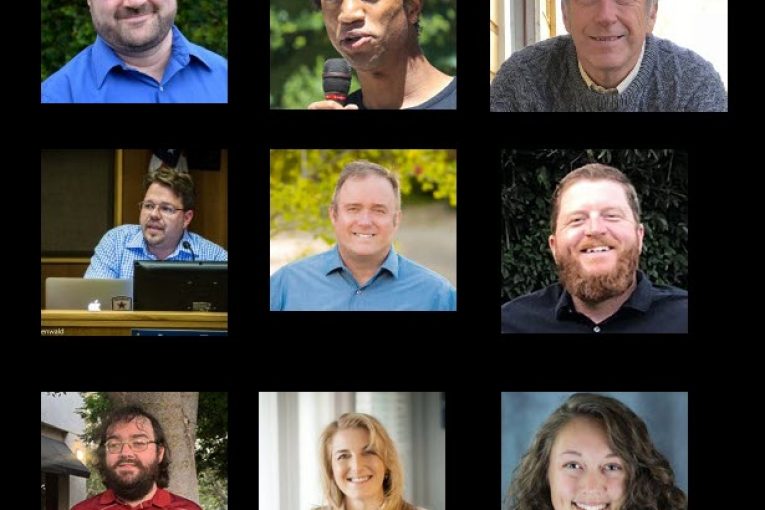

This is our fourth of eight questions. The candidates get exactly 250 words. The answer was due at 9 pm on Thursday.
Question: Earlier this year, the council approved the leasing of a city property to BrightNight. Did the council make the right decision? Discuss that decision as well as issues that have been raised with regard to transparency and process.
District 2
 Will Arnold
Will Arnold
Our community has long advocated for us to redouble our sustainable energy efforts and move away from existing power grids. An opportunity to provide significant renewable energy – one that would also provide general fund revenue for the City – presented itself and the Council jumped at it.
We received a great deal of varying input regarding this opportunity. Some supported the action, while others supported it in concept but felt we should have driven a  harder bargain with the energy provider. Others disagree with the concept of a solar farm entirely and expressed a belief that solar should be limited to rooftops and parking lots. Still others had varying alternative ideas for use of the land.
harder bargain with the energy provider. Others disagree with the concept of a solar farm entirely and expressed a belief that solar should be limited to rooftops and parking lots. Still others had varying alternative ideas for use of the land.
With such widely varying opinions on the matter, consensus may have been difficult to reach irrespective of the process in place. But I believe the lesson from this issue is that we should have tried harder to achieve such consensus nonetheless, even if it meant losing out on this particular opportunity.
 Colin Walsh
Colin Walsh
Just as the City Council made a decision on the DISC project without full analysis and without adequate consideration of input from the relevant commissions, the same happened with BrightNight – but worse. Commissioners from several different commissions called in to point out that they had not been consulted, outlining numerous serious concerns with the proposed agreement, but it was approved anyway, with only one councilmember dissenting. Staff led them to believe that the decision was urgent. But “great deal, only if you act now!” has never been a wise strategy to follow.
I think the concerns about the BrightNight agreement were well summed up by a joint letter that appeared publicly immediately following the decision, including: the lease rental rates are undervalued and do not consider opportunity costs (the rates were not appropriate derived, better rates were negotiated by other agencies, the rental rate escalator does not reflect inflation, and alternative land uses may yield more revenue) and the agreement terms unnecessarily expose the City to a variety of risks/liabilities (the excessive lease period has inadequate exit provisions, there are no guarantees that the City or its residents will benefit, since the Agreement provides for no provision of energy or capacity to the City or the Valley Clean Energy Authority, and BrightNight/PVEL is free to sell its renewable energy to any buyer anywhere in the Western regional interconnection).
This was a terrible decision, and an illustration of what needs to be improved with regard to transparency and process.
District 3
 Larry Guenther
Larry Guenther
Absolutely not. Transparency and community engagement in this was virtually non-existent. The first City Council meeting was closed-session. There was no real explanation as to why.
One fundamental way to ensure fiduciary responsibility is to get multiple quotes through a request for proposals. This was not done and the City went with a sole-source  contract. As one council member said, “We don’t know that something better is out there.” Correct. We don’t know because we didn’t look.
contract. As one council member said, “We don’t know that something better is out there.” Correct. We don’t know because we didn’t look.
The City will be in a 54-lease where the rates are based on agricultural value instead of commercial value. We don’t own the solar panels and we don’t get the electricity. The electricity will be sold on the open market. Those market rates will surely go up faster than the lease adjustments determined in the contract.
There was no public hearing on the best and highest use of that property. The City simply decided it should be a solar farm. Not only were the relevant Commissions not engaged, they were actively talking to staff about various uses for that property while staff was negotiating/talking with BrightNight.
Solar on open space before putting it on rooftops or parking lots is backwards.
This is the culmination of a culture that views public engagement as a burden instead of a benefit.
One cannot separate process from product. Bad process yields a bad product.
District 5
 Josh Chapman
Josh Chapman
The city council did not make the correct decision with their 4-1 vote to approve the BrightNight lease agreement. From the start, summer 2019, this project was kept out of the public eye. Additionally, the City commissions were left out of this process until the staff report was released 3 days before the March 24th, 2020 vote.
The false sense of urgency that was created, which saved the developer from having to post the refundable $250,000 bond, was a failure in transparent public policy. Further exacerbating the negative impact of a flawed process and lack of oversight is that there is absolutely no guarantee that the energy produced by this solar farm will stay in, and be provided to, Davis residents.
We should be proud of the volunteers who serve on our City commissions! City staff and council members should be utilizing the expertise that members of these commissions bring to the table.  We need to be looking at city property and having community conversations around ways in which we can use these spaces to make our community better.
We need to be looking at city property and having community conversations around ways in which we can use these spaces to make our community better.
There had been discussions about that specific piece of property and how it could contribute to environmental sustainability within our community. Who made the decision that the best use of that land for our community was a solar farm? That should be a publicly driven, open conversation and should reflect the values of our community. Public engagement should be viewed as an asset to our city council.
 Kelsey Fortune
Kelsey Fortune
The closed-door Bright Night negotiations led to a subpar outcome, but I am far more concerned with the process than the outcome. Doing business in private means that five Council members, who are not necessarily experienced with leasing land or knowledgeable about clean energy, are making less informed decisions than are possible. If other city decisions are made using this private process, decisions will be suboptimal for our community.
However, this issue of communication, transparency, and process extends past these specifically private decisions. The general interactions between the Council, commissions, and public fall short. I would like direct interaction between commissions and Council in meetings. Council should also address public concern and provide the community with explanations of their thoughts during and after decisions.
I recently read an opinion concerning public safety that made a false comparison between elected officials and car mechanics. The purpose of a Council member is not to know everything but to listen to the needs and wants of diverse groups of community members, pair this with expert input, and lead the community to the best, creative solutions.
I always come back to the fact we all have blind spots which can be identified through inclusive conversations. As a Council member, I will purposefully engage with those who may be impacted by my decisions. I will write regular explanations of my positions. I will have regular “office hours” like I am doing now, so anyone can have a conversation with their representative. I am listening.
 Connor Gorman
Connor Gorman
This decision had a number of problems and should not have been implemented by the City Council, at least not in the form or manner that it was. To begin with, the approval process was extremely opaque which is a problem on its own and is also part of the reason the deal itself had so many issues. In particular, both the public and our City’s Commissions, which are full of experts on this and numerous other topics, should have played a major role here and we need to ensure that they do so going forward.
Second, the content of this agreement had much to be desired. I believe that all utilities, from water to electricity to internet to waste disposal, should be owned and controlled democratically, typically by municipalities or counties, even under the current (capitalist) system. This means I’m strongly in favor of solar energy but would have preferred to pursue direct ownership by the City or related entities rather than a deal with a private company (the same way I’m in favor of municipalizing PG&E). However, like with development projects, even when it comes to private entities, we can and must push them to provide as many benefits to our community as possible. In the BrightNight case, that doesn’t appear to have happened and it’s quite possible the City could have gotten more in terms of financial contributions and/or a requirement to service Davis rather than allowing them to potentially sell the electricity they generate elsewhere.
 Rochelle Swanson
Rochelle Swanson
I think the Council would have been better served to issue a Request for Proposals (RFP) as to the use of the available property, then make a fully informed decision. It very likely may have been the right use and partner for the project, however the process used to reach the vote leaves that decision open to question.
At minimum, a special session could have been called for a joint meeting of key commissions to review the proposal.
A clear and transparent process is needed that sets up reasonable expectations for the community, staff, Council members and commissions.
I propose a decision-making grid that lists the required process for projects anticipated to come before Council and the Planning Commission. Project applicants would know up front which commissions they must go through. Commissions will know when they will be consulted.
Not every project will go before every commission. In addition, if there is a time-sensitive opportunity like Bright Night, then commissions know they will be subject to special joint meetings to ensure timely review. It also ensures that each party is aware that they need not be subjected to repeated cycles of review.
In addition to the formal decision-making grid, new policies should be adopted where a chair of a commission is able to present their commission’s report. This allows for a robust dialogue with Council. The more discretion that can be removed from the process, the less turmoil will ensue post decision.
Support our work – to become a sustaining at $5 – $10- $25 per month hit the link:

I’m glad to see the universal recognition that the consideration of the BrightNight deal was an abject failure of the City’s process. The support for our proposal to make the City’s planning and decision process more transparent with more citizen involvement also looks to have universal support. Even the current Council member here agrees with that sentiment and I appreciate his willingness to reconsider his action.
A group of us met with City management September 21 and made good progress. Some of the details are certain to change after our discussions with management. The Council will consider how to move forward next Tuesday, so you can voice your support for including the proposals authors in the Staff’s evaluation of next steps in developing an implementation plan.
See the initial proposal here:
https://www.change.org/p/city-of-davis-a-proposal-for-improving-city-of-davis-decision-making-ffaa61cd-59d4-42b6-a899-5501d37e2343